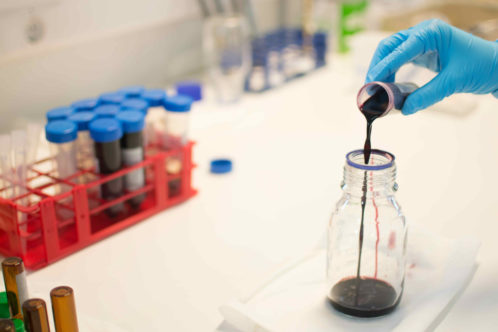Best Chemical Engineering Colleges in Bangalore, India – Career, Scope & job Opportunities

Let’s apply “divide and conquer” rule to break the fat word “chemical engineering” into bite sizeable chunks.
Dictionary says Chemistry is the branch of science concerned with the substances of which matter is composed, the investigation of their properties and reactions, and the use of such reactions to form new substances. Everything on this earth is made up of substances.
The chair you’re sitting on, the device through which you’re reading this article, heck hell even our body is made up of substances. There’s Chemistry everywhere! As mentioned in the above lines, chemistry is nothing but the detailed study of the substances of which matter is composed. Basically, chemistry can be applied to everything and anything.
What does the word “Engineering” mean? More often than not we are tempted to complicate its meaning as it sounds like one of those jargons. In simplest and realistic terms, to engineer means to design and build something.
Now, what’s chemical engineering?
Chemical engineering is a disciple involving the application of Chemistry, physics and mathematics along with economics to the processes carried out to efficiently produce, transform (convert raw materials into more useful valuable forms) and transport chemicals, materials and energy.
What Chemical Engineering is and what not?
Role of a chemical engineer is often confused with that of a chemist’s. Chemists are those with white aprons working in a laboratory experimenting and studying the properties and behaviors of substances, the knowledge of which is applied to either improvise existing products or invent new products and methods to preserve, transform and transport them. The tried and tested methods invented and approved by chemists are then handed down to chemical engineers to scale up the sample reactions to happen on a larger scale.
For example, a formula for a new detergent is designed by chemists in a lab (small scale) using a typical apparatus. For this product to reach the consumers out there, it needs to be produced in large amounts in massive reactors and then ship them out in thousands of bottles. But, how do we do this? Simple, just add more chemicals and do everything else the same way as the chemists did. Well, it doesn’t work this way. And here’s when the chemical engineers come into the picture.
Chemical engineering doesn’t mean only chemistry or math. While producing on a large scale, a lot more has to be considered than just working with chemicals. It involves creating things at so many different levels. Chemical engineers combine the principles of chemistry and engineering to mass produce the consumer products by designing and adapting the methods from the lab to the large scale at manufacturing plants.
What exactly do Chemical Engineers do?
- They are solely responsible for the design, construction and installation of plants and reactors. This includes:
- Identifying and stating definite construction specifications, design and plan equipment layout
- Applying engineering principles to design and size the pipes properly; this is very crucial as releasing too much of chemicals too fast is dangerous.
- Design the cooling components of the plants to maintain an ideal temperature while the plants are in operation. Even the slightest of ignorance comes with a huge cost; which might even result in blowing off the plant itself.
- Design the control system that goes along with the reactors like temperature sensors and flow sensors.
- They are responsible for conducting safety and hazard assessments and design the safety components accordingly.
- Supervise and maintain operations of plants.
- Plan, design, test and troubleshoot production methods
- Design, develop and analyze Processes (A.K.A Process engineering)
- Involved in research and development activities to improvise and advance manufacturing processes.
- Estimate production costs for management.
- Prevent and take safety measure to control environmental hazards which includes waste management and byproducts treatment.
Scope and Career Opportunities:
Chemical Engineering is applied in various fields which brings along a wide spectrum of career opportunities. Chemical engineers expertise in any of the niche fields like process engineering, design & construction of plants, operations & maintenance, management, teaching, research & development and work in the respective departments.
Few of the major industries that provide a wide scope for chemical engineering are mineral based industries, biotechnology and pharmaceutical, food and drink production, environmental engineering application, petroleum refineries and manufacturing of industrial chemicals like paints and dyes, detergents and cosmetics
One of the less known applications of chemical engineering is the manufacturing of semiconductors and electrical components. Companies like IBM hire more chemical engineers than electrical engineers, as lots of chemical design and processes are involved in the manufacturing of microchips. Similarly, there’s a huge demand for chemical engineers in alternate energy industries involving manufacturing of solar cells and fuel cells.
Salary:
The average salary of a chemical engineer graduate can be anywhere between 4 lakhs to 11 lakhs per annum. Like every other career, salary increases with experience and higher education qualifications.
Education:
Mandatory subjects like chemistry, physics and mathematics are the subjects to be studied in 12th for those planning to pursue chemical engineering. Graduate degree in chemical engineering is the minimum qualification required to work as a chemical engineer. Higher degrees like masters and Ph.D. deepen the roots of one’s career in the field of chemical engineering.
Eligibility criteria for UG courses:
- 12th pass with chemistry, physics and mathematics as mandatory subjects
- Clear Entrance tests like CET, JEE, Gate.
What do they study?
Most UG courses are a 4-years program. One of the obvious subjects they study is chemistry. Chemistry knowledge is needed to understand how the chemicals react and behave in reactors. But that’s only a piece and parcel of chemical engineering. Physics concepts like thermodynamics and fluid dynamics are very essential for designing processes and plants. More often than not physics and mathematics go hand in hand.
Biology is also one of the major subjects and is needed in the design and development of products involving biotechnology. Application of software tools like CAD is also a part the syllabus. Chemical engineers a.k.a Universal engineers, study a little bit of everything along with chemistry; like programming, electrical, economics, management and even psychology.
Best Chemical Engineering Colleges in India:
- ICT Mumbai
- Indian Institute of Technology Bombay
- Indian Institute of Technology Delhi
- Dr. B R Ambedkar National Institute of Technology, Jalandhar
- Malavia National Institute of Technology Jaipur
- Indian Institute of Technology Kharagpur
- Thapar University, Patiala
- Motilal Nehru National Institute of Technology, Allahabad
- Birla Institute of Technology and Science
- Indian Institute of Technology Hyderabad
Best Chemical Engineering Colleges in Bangalore:
- V. College of Engineering
- BMS College of Engineering
- Ramaiah Institute of Technology
- Dayanand Sagar College of Engineering
- V.J College of Engineering



